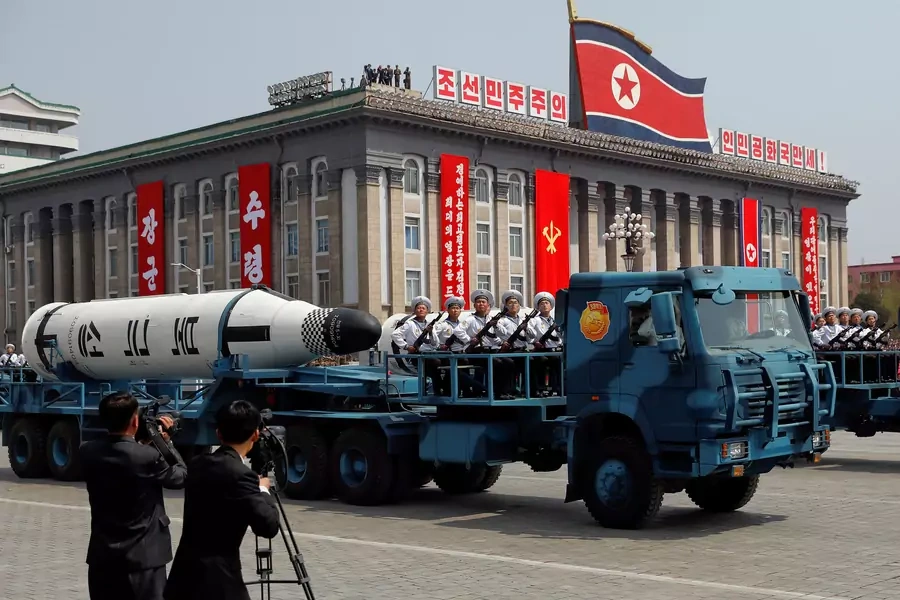The United States and North Korea: Time for a New Approach

Douglas Mo is an intern at the Council on Foreign Relations and a rising senior at Colby College.
On the evening of June 20th, President Donald Trump tweeted: “While I greatly appreciate the efforts of President Xi & China to help with North Korea, it has not worked out. At least I know China tried!” Based on this tweet, President Trump appeared to give up on his plan to rely on China to solve the North Korean crisis. Nine days later, the Trump administration imposed secondary sanctions on a Chinese shipping company that sends coal and steel between China and North Korea; the Bank of Dandong, a Chinese entity accused of laundering money for North Korea; and two Chinese citizens, who helped North Korea evade sanctions. Then, after North Korea’s successful ICBM test on July 4th, the Trump administration proposed wider sanctions against countries that conduct business with North Korea. Unfortunately, these sanctions will neither work, nor convince China to act. Here are three reasons why.
More on:
First, secondary sanctions rest on the mistaken belief that China is more concerned about trade with the United States than stability on the Korean Peninsula. China fears that a collapsed regime will lead to millions of North Korean refugees spilling across its border. In addition, although Beijing objects to a nuclear North Korea, it is even more concerned about the prospect of a unified Korea with Seoul as its capital. North Korea serves as a buffer between China and the U.S. regional alliance system. Because of these two considerations, China has largely turned a blind eye to its companies that do business in North Korea and only sporadically implements some of the sanctions that directly relate to the North’s ballistic missile program.
Second, UN Security Council sanctions have not succeeded and are unlikely to succeed in the future. Since 2006, the UN Security Council has passed four sanctions resolutions against North Korea. These resolutions require member countries to comply with a series of obligations, such as preventing North Korea from accessing banking and financial services. However, enforcement of UN sanctions has been “insufficient and highly inconsistent” and has created countless loopholes that have been exploited by North Korea. There is no reason to expect that this situation will change in the near future.
Third, the North Korean regime has found ways to access capital outside of its borders, such as sending thousands of its citizens abroad to operate a number of state-run restaurants that provide finances for Pyongyang. Sanctions crippled Iran economically because of the nation’s heavy reliance on the international oil market and financial system. In contrast, North Korea has diffuse sources of foreign currency, a tradition of operating in a gray area of illegal trade, and exerts greater control over its own people, thus making Pyongyang less susceptible to punitive economic measures, like sanctions.
Given the limited effectiveness of sanctions on North Korea and China, it is time for the administration to take a new approach. President Trump and President Xi should pursue a two-step strategy. The United States should first adopt the dual freeze proposal suggested by Chinese Foreign Minister Wang Yi and reiterated by two Chinese officials at the U.S.-China Diplomatic and Security Dialogue held in Washington on June 21st. Under this scenario, the United States would suspend U.S.-South Korean military exercises in exchange for the suspension of North Korean missile development and testing. In return, China should agree to help monitor North Korea’s actions by withholding economic benefits. Beijing can do this by providing disbursements to Pyongyang, as well as security assurances, for North Korean compliance – a proposal recently introduced by Victor Cha and Jake Sullivan, foreign-policy advisers in the Bush and Obama administrations, respectively. If North Korea continues to develop its weapons program or conducts any missile tests, Beijing will lose not only its financial contributions but also diplomatic credibility.
North Korea is often referred to as the land of lousy options. Although the United States would not achieve all of its goals, pursuing the dual freeze option and having China monitor North Korea’s actions through payments is the least-bad option. It will help manage risk escalation in the region, and also shift a reasonable amount of responsibility to Beijing for reigning in Pyongyang.
More on:
 Online Store
Online Store